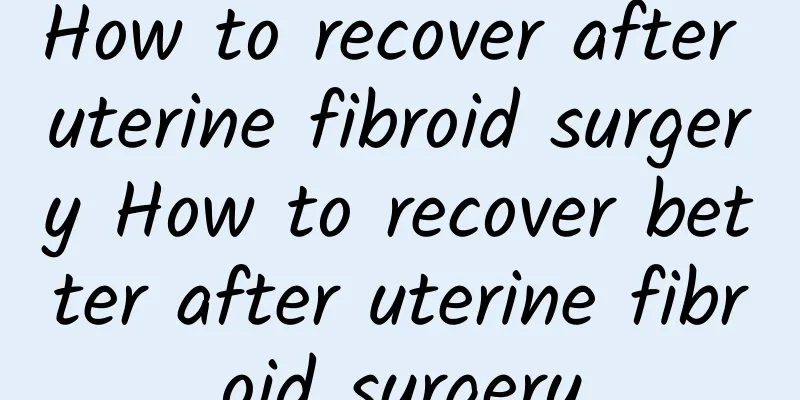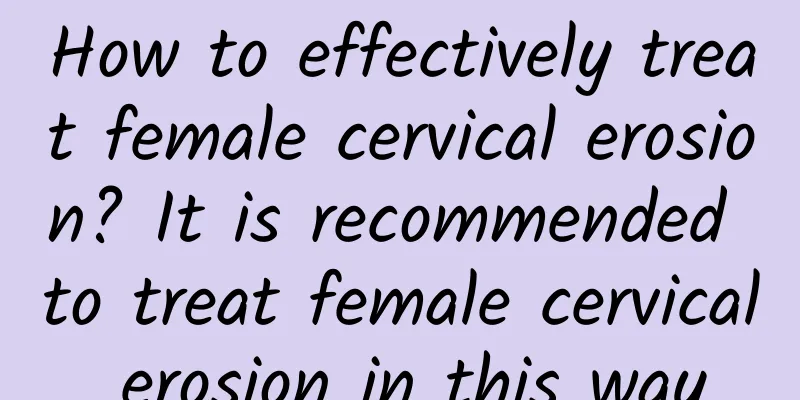How to recover after uterine fibroid surgery How to recover better after uterine fibroid surgery

|
With the increasing incidence of uterine fibroids, more and more women are very concerned about uterine fibroids. Surgical treatment has always been the first choice for treating uterine fibroids. Therefore, many female friends are more concerned about the postoperative care of uterine fibroids. Experts say that reasonable and correct care can better recover from the disease, the specific content is as follows. 1. It takes a while to recover after uterine fibroid surgery, and it is very painful, so non-malignant uterine fibroids have always been treated conservatively. When the patient reaches menopause, even the uterus and uterus are completely removed. It belongs to the removal of fibroids and organ removal, and the relative wound and bleeding are relatively large. 2. After uterine fibroid surgery, patients should pay attention to recovery, maintain a comfortable life, do some light exercise to help the body recover. Patients who have undergone laparoscopic fallopian tube surgery and laparoscopic ovarian surgery should resume normal work and rest two weeks after surgery. If hysterectomy is used, special attention should be paid to avoid lifting objects over 5 kg or activities that increase the burden on the abdomen. After 8 weeks, gradually increase the amount of exercise according to personal physical strength and physique. 3. Minimally invasive treatment of uterine fibroids: With the development of minimally invasive technology, uterine fibroid surgery has become simpler. The doctor makes three 5 mm incisions in the hidden part of the patient's abdomen and then inserts a laparoscope. Through the TV monitoring screen connected to the laparoscope, the enlarged abdominal cavity can be clearly observed, and then the device left outside the patient's body can be operated for treatment. Minimally invasive uterine fibroid surgery has a short recovery time, does not reduce the patient's own immunity, is not prone to infection, abdominal or pelvic adhesions, maintains the integrity of female reproductive organs such as the uterus, and maintains female fertility and harmonious married life. Patients can get up 6 hours after surgery or the next morning and eat normally. 4. During the recovery process after uterine fibroid surgery, the nutritional intake is the same in principle. We should drink more water to replenish the loss of body fluids during surgery. First, drink some warm water. You can start eating liquid food without discomfort. Because protein is needed for wound healing, we should eat high-protein food. After minimally invasive surgery, the intake of vegetables and high-fiber fruits should be increased. The above introduces the postoperative care methods for uterine fibroids. Gynecological experts said that in recent years, the treatment of uterine fibroids is no longer limited to surgical treatment. The emergence of minimally invasive technology has brought better treatment for the disease. Minimally invasive treatment can relieve patients' pain and quickly recover, and is deeply recognized by patients. |
>>: Treatment methods for uterine fibroids surgery What to eat after uterine fibroids surgery
Recommend
Can I get pregnant and have a baby if I have an ovarian cyst?
It is possible to become pregnant and have a chil...
Abdominal obesity during menopause leads to cardiovascular disease! Chinese medicine doctor Wu Mingzhu: 3 teas to help burn fat and lose weight
Abdominal obesity after menopause is a problem fo...
How to choose various surgical methods for uterine fibroids
Surgery is a traditional and effective method for...
If you want to stay away from cervical hypertrophy, you must learn how to prevent it
The harm of cervical hypertrophy is very great, a...
What are the methods for treating adnexitis?
Adnexitis is the most common gynecological inflam...
When is the right time to get the flu shot for adults?
The best time for adults to get a flu vaccine is ...
Detailed introduction to pre-abortion inspection knowledge
Young people nowadays know the importance of pre-...
Get rid of the carrot legs! Three-step all-round leg slimming
[Key points]: How to lose weight with carrot legs...
Pay attention to the differential diagnosis of bacterial vaginosis
Bacterial vaginosis is a common gynecological dis...
Describe the typical symptoms of hyperplastic vulvar leukoplakia
Many people want to know the symptoms of hyperpla...
Is bleeding from uterine fibroids dangerous?
Bleeding caused by uterine fibroids requires prom...
As a woman, you should know the early symptoms of cervicitis
Many patients fail to detect cervicitis in time b...
Two major misunderstandings in the treatment of uterine fibroids
There are two common misunderstandings about the ...
How to treat habitual miscarriage? Do these 4 things
Habitual miscarriage is a problem that troubles m...
Will 1.5CM of pelvic fluid affect my life?
Will my life be affected if I have 1.5cm of pelvi...









